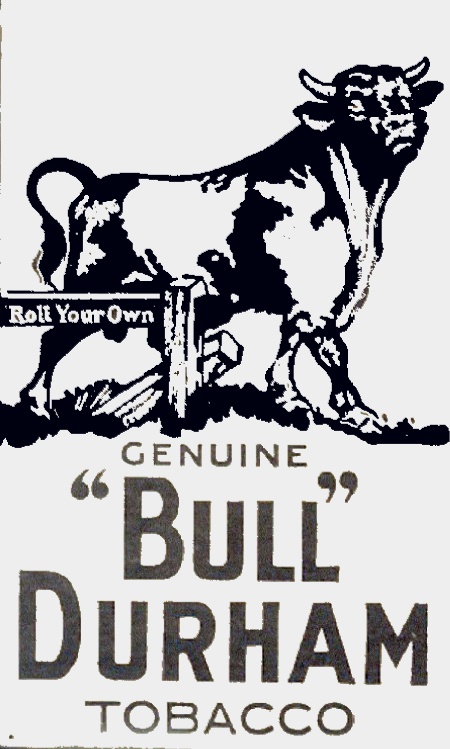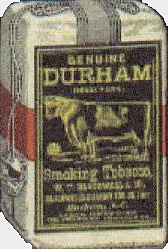HOWARD HICKSON'S HISTORIES
[Index]
And That Ain't Bull
Another American West Tradition Bites the Dust
Astride his horse, squatting by a campfire,
matching wits with Lady Luck, or elbow down on a bar, most early Elko County
cowhands were apt to reach for a little tag hanging from his vest or shirt
pocket.
A tug on the tag and out popped a small cloth
sack. Its label was a common one, Genuine Durham Smoking Tobacco.
Nobody, except a rank know nothing tenderfoot, called it that. To the cowpoke
it was always...Bull Durham. It was common practice 'cause a lot
of them waddies couldn't read but they sure recognized the bull on the
label.
Those knights of the sand and sage hardly
ever called anything by its right name. Cigarettes became quirlys, paper-collar
stiffs, pimp sticks and other equally confusing things. The thin papers
used to roll cigarettes were in a packet shoved down between the label
and sack. They were called dream books, prayer books, blankets and Bibles.
Tobacco was heifer dust, makin's, and rollin's.

Bull Durham was an institution in the
Old West. There were, of course, other brands but who remembers them?
It all began after the Civil War. John Green,
a tobacco farmer just outside Durham, North Carolina, was deluged with
orders from discharged Yankee soldiers who asked for "that fine Durham
smoking tobacco."
Yankees, or not, Green was ready to make a
fast buck. He abandoned his pre-war brand, Best Flavored Spanish Smoking
Tobacco, and renamed his product Genuine Durham Smoking Tobacco.
When the new label was being designed, Green
looked at the wrapping on a jar of Coleman's Mustard. He took a liking
to the bull on the trademark and ordered the printer to put a Durham bull
on the label.

Bull Durham was an instant success.
The design became the most famous trademark in the world. Lord Alfred Tennyson,
Rudyard Kipling and Will Rogers endorsed the product. Success continued
long after ready-mades hit the market in 1881. People who worked outdoors
found the bag and paper method still the most convenient and resisted change
to packaged smokes well into the 20th century. Advertising claimed that
a bag provided 40 rollings in each muslin sack.
Another legend of the West began in Durham,
North Carolina, home of Bull Durham tobacco. The first denim in
the United States was produced in a local mill.
Wonder what a wrangler, just bucked
off the worst bronc in the horse string, bruised, stretched out of shape,
and with a crummy disposition after biting the dust a couple of times,
would think if he pulled out a pack of coffin nails and read: "Warning:
The Surgeon General has determined that smoking is dangerous to your health."
I recently checked around town and couldn't
find any Bull Durham. Has it finally gone the way of many other legends
of the American West?
Howard Hickson
September 30, 2001
©Copyright 2001 by Howard Hickson. Permission to
use is given but, if any portion or all of this article is quoted, proper
credit must be given.
[Back to Hickson's
Histories Index]
|

